人教新目标版英语八年级上册 Unit 10 If you go to the party you'll have a great time导学案
文档属性
| 名称 | 人教新目标版英语八年级上册 Unit 10 If you go to the party you'll have a great time导学案 | 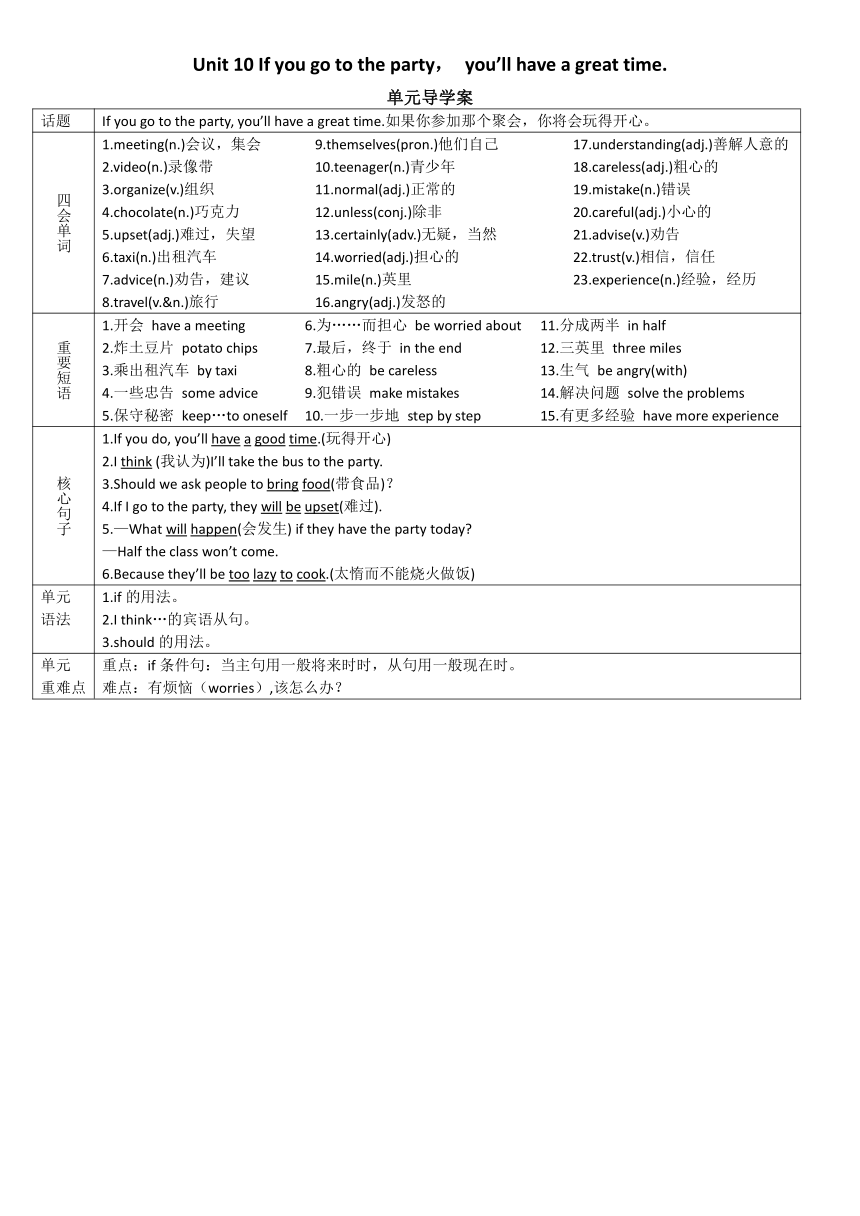 | |
| 格式 | doc | ||
| 文件大小 | 75.9KB | ||
| 资源类型 | 教案 | ||
| 版本资源 | 人教新目标(Go for it)版 | ||
| 科目 | 英语 | ||
| 更新时间 | 2023-07-09 11:16:11 | ||
图片预览

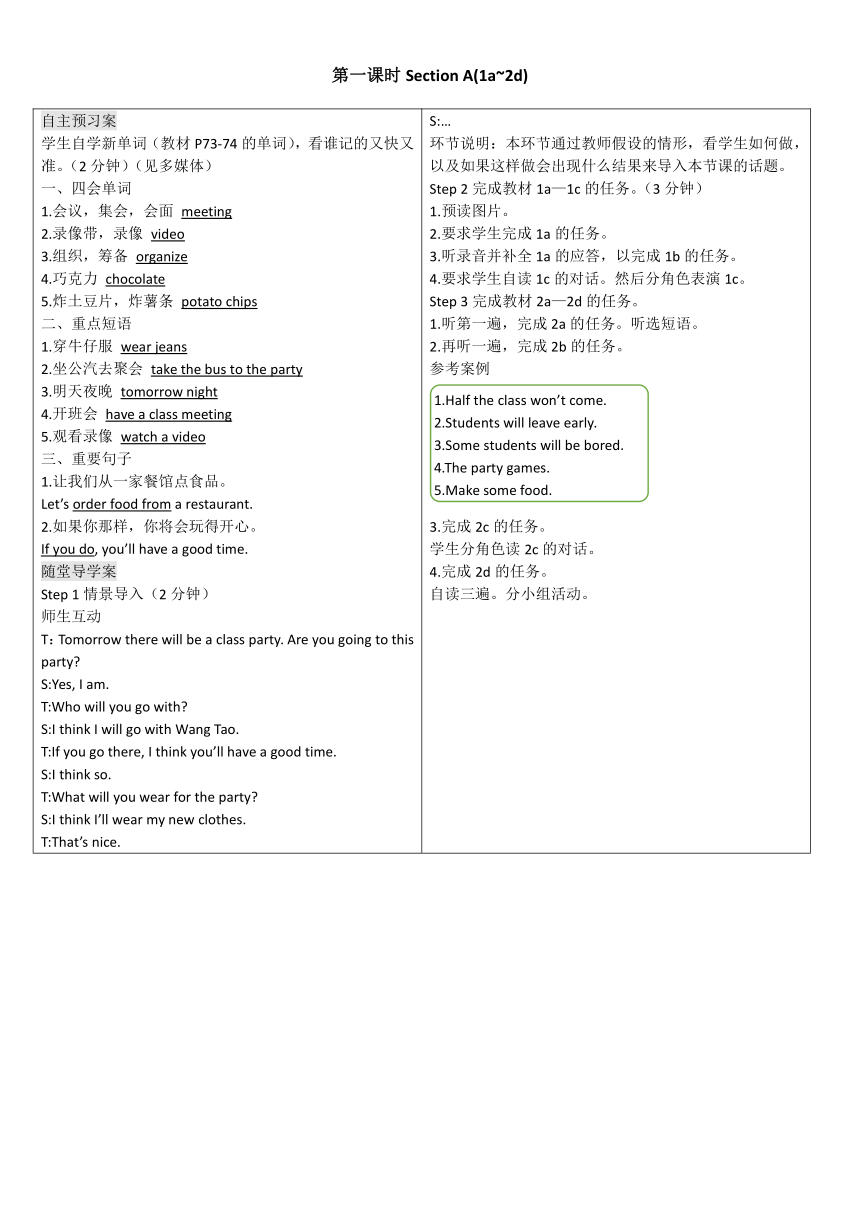
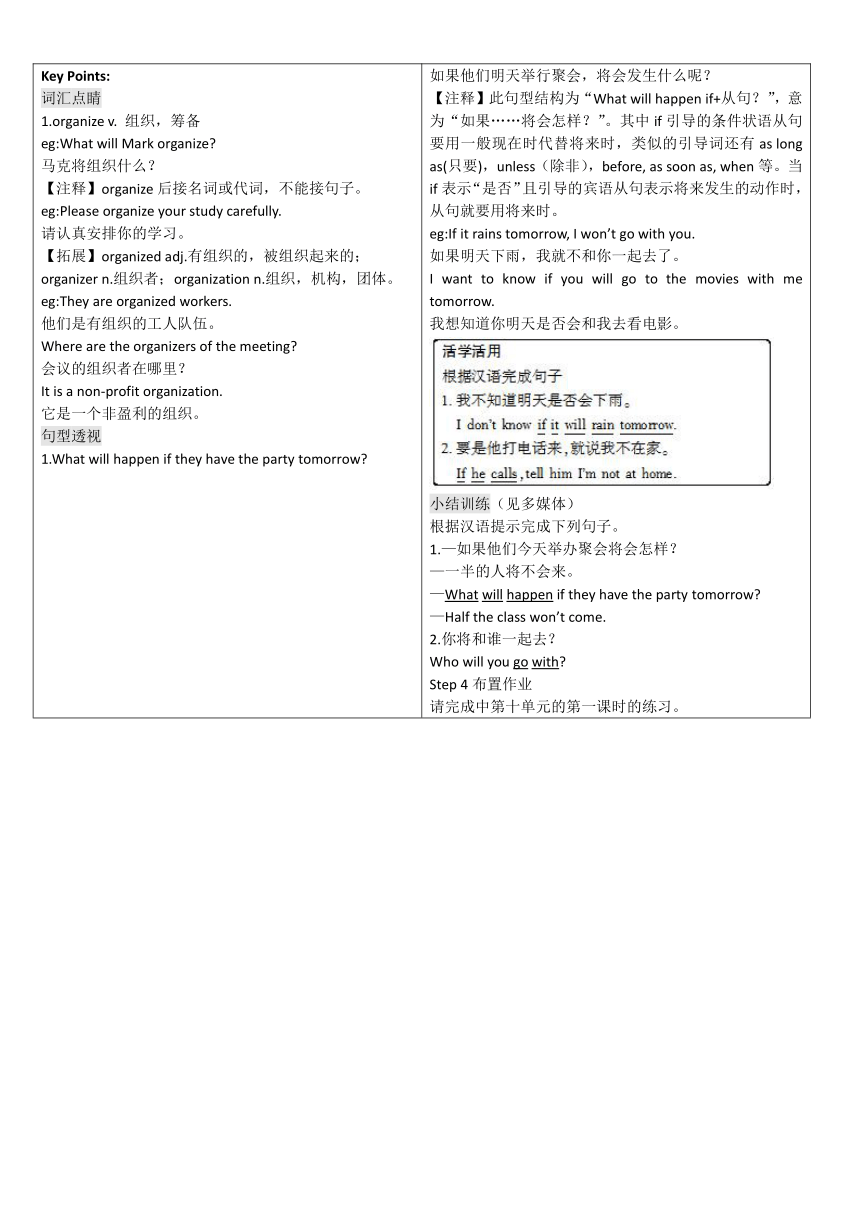
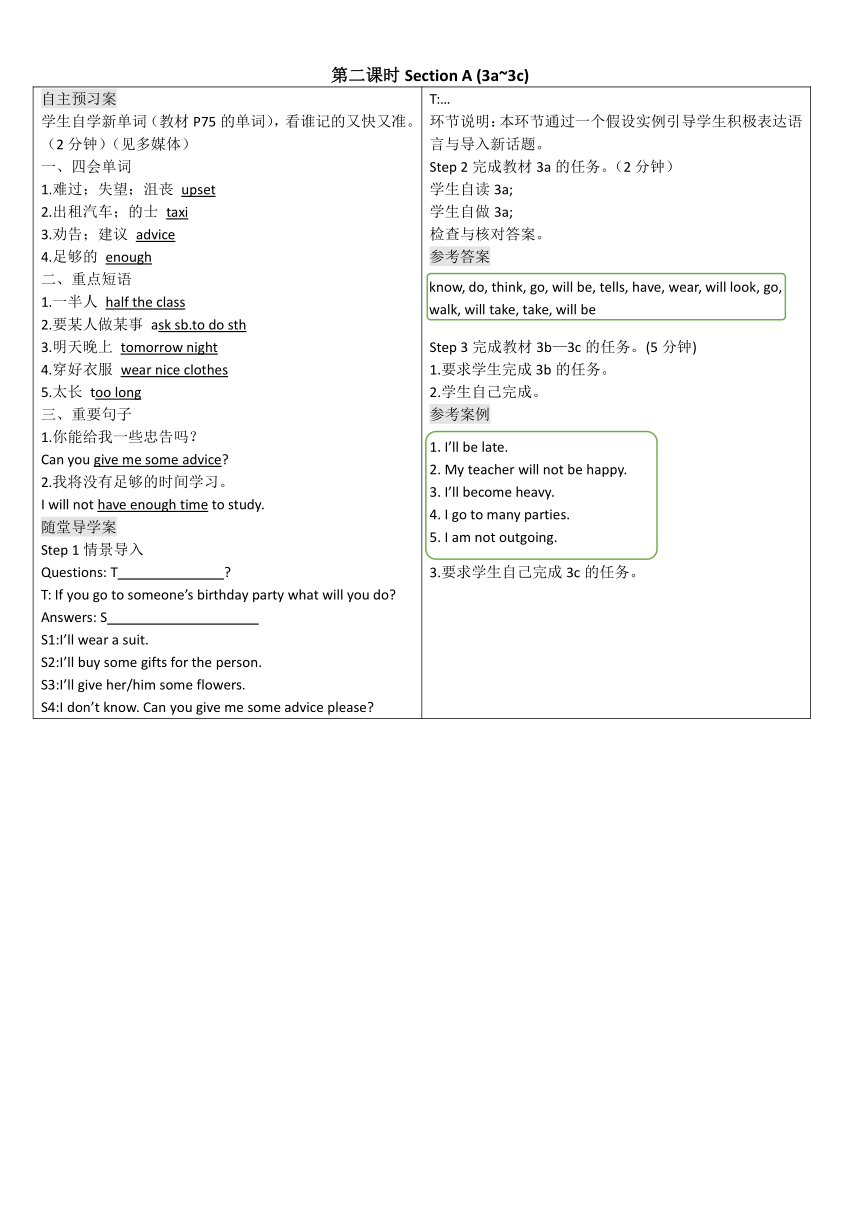
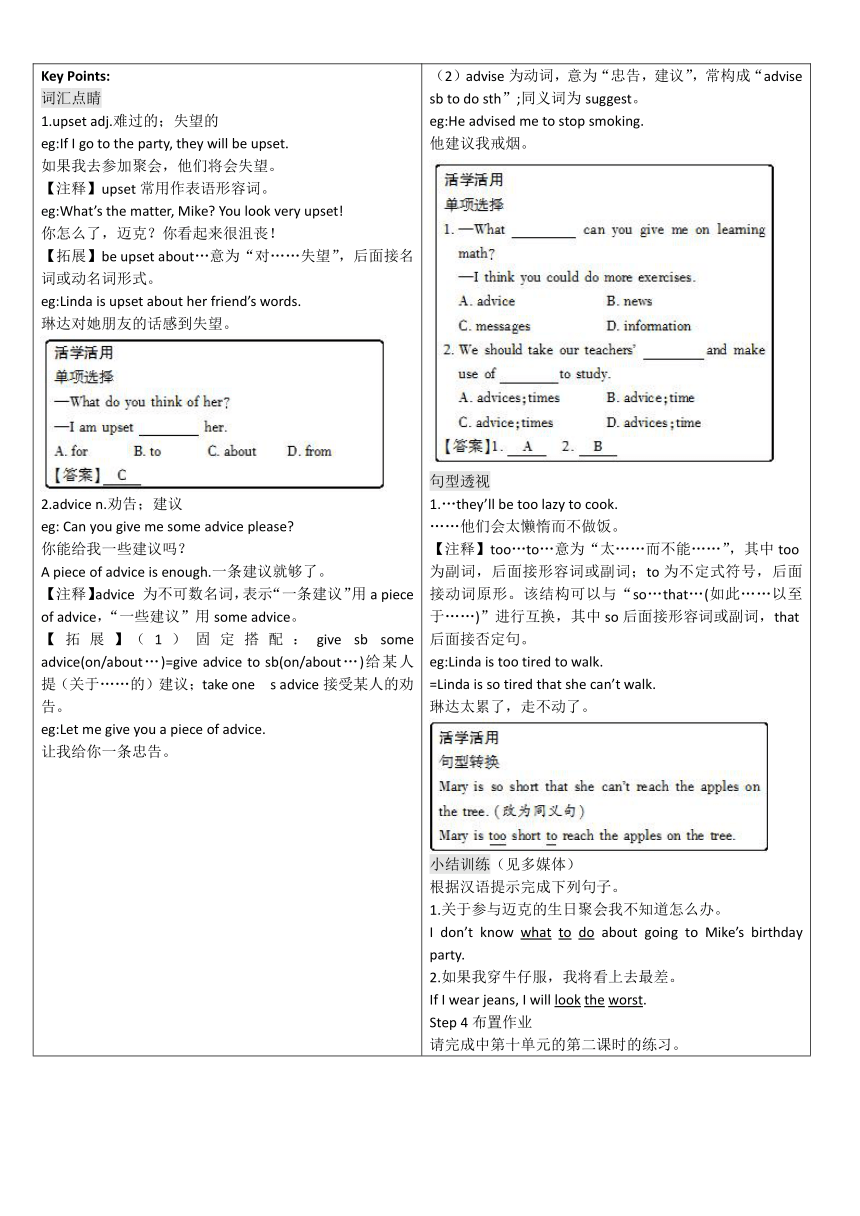
文档简介
Unit 10 If you go to the party, you’ll have a great time.
单元导学案
话题 If you go to the party, you’ll have a great time.如果你参加那个聚会,你将会玩得开心。
四会单词 1.meeting(n.)会议,集会 2.video(n.)录像带 3.organize(v.)组织 4.chocolate(n.)巧克力 5.upset(adj.)难过,失望 6.taxi(n.)出租汽车 7.advice(n.)劝告,建议 8.travel(v.&n.)旅行 9.themselves(pron.)他们自己 10.teenager(n.)青少年 11.normal(adj.)正常的 12.unless(conj.)除非 13.certainly(adv.)无疑,当然 14.worried(adj.)担心的 15.mile(n.)英里 16.angry(adj.)发怒的 17.understanding(adj.)善解人意的 18.careless(adj.)粗心的 19.mistake(n.)错误 20.careful(adj.)小心的 21.advise(v.)劝告 22.trust(v.)相信,信任 23.experience(n.)经验,经历
重要短语 1.开会 have a meeting 2.炸土豆片 potato chips 3.乘出租汽车 by taxi 4.一些忠告 some advice 5.保守秘密 keep…to oneself 6.为……而担心 be worried about 7.最后,终于 in the end 8.粗心的 be careless 9.犯错误 make mistakes 10.一步一步地 step by step 11.分成两半 in half 12.三英里 three miles 13.生气 be angry(with) 14.解决问题 solve the problems 15.有更多经验 have more experience
核心句子 1.If you do, you’ll have a good time.(玩得开心) 2.I think (我认为)I’ll take the bus to the party. 3.Should we ask people to bring food(带食品)? 4.If I go to the party, they will be upset(难过). 5.—What will happen(会发生) if they have the party today —Half the class won’t come. 6.Because they’ll be too lazy to cook.(太惰而不能烧火做饭)
单元 语法 1.if的用法。 2.I think…的宾语从句。 3.should的用法。
单元 重难点 重点:if条件句:当主句用一般将来时时,从句用一般现在时。 难点:有烦恼(worries),该怎么办?
第一课时Section A(1a~2d)
自主预习案 学生自学新单词(教材P73-74的单词),看谁记的又快又准。(2分钟)(见多媒体) 一、四会单词 1.会议,集会,会面 meeting 2.录像带,录像 video 3.组织,筹备 organize 4.巧克力 chocolate 5.炸土豆片,炸薯条 potato chips 二、重点短语 1.穿牛仔服 wear jeans 2.坐公汽去聚会 take the bus to the party 3.明天夜晚 tomorrow night 4.开班会 have a class meeting 5.观看录像 watch a video 三、重要句子 1.让我们从一家餐馆点食品。 Let’s order food from a restaurant. 2.如果你那样,你将会玩得开心。 If you do, you’ll have a good time. 随堂导学案 Step 1情景导入(2分钟) 师生互动 T:Tomorrow there will be a class party. Are you going to this party S:Yes, I am. T:Who will you go with S:I think I will go with Wang Tao. T:If you go there, I think you’ll have a good time. S:I think so. T:What will you wear for the party S:I think I’ll wear my new clothes. T:That’s nice. S:… 环节说明:本环节通过教师假设的情形,看学生如何做,以及如果这样做会出现什么结果来导入本节课的话题。 Step 2完成教材1a—1c的任务。(3分钟) 1.预读图片。 2.要求学生完成1a的任务。 3.听录音并补全1a的应答,以完成1b的任务。 4.要求学生自读1c的对话。然后分角色表演1c。 Step 3完成教材2a—2d的任务。 1.听第一遍,完成2a的任务。听选短语。 2.再听一遍,完成2b的任务。 参考案例 (
1.Half the class won’t come.
2.Students will leave early.
3.Some students will be bored.
4.The party games.
5.Make some food.
) 3.完成2c的任务。 学生分角色读2c的对话。 4.完成2d的任务。 自读三遍。分小组活动。
Key Points: 词汇点睛 1.organize v. 组织,筹备 eg:What will Mark organize 马克将组织什么? 【注释】organize后接名词或代词,不能接句子。 eg:Please organize your study carefully. 请认真安排你的学习。 【拓展】organized adj.有组织的,被组织起来的; organizer n.组织者;organization n.组织,机构,团体。 eg:They are organized workers. 他们是有组织的工人队伍。 Where are the organizers of the meeting 会议的组织者在哪里? It is a non-profit organization. 它是一个非盈利的组织。 句型透视 1.What will happen if they have the party tomorrow 如果他们明天举行聚会,将会发生什么呢? 【注释】此句型结构为“What will happen if+从句?”,意为“如果……将会怎样?”。其中if引导的条件状语从句要用一般现在时代替将来时,类似的引导词还有as long as(只要),unless(除非),before, as soon as, when等。当if表示“是否”且引导的宾语从句表示将来发生的动作时,从句就要用将来时。 eg:If it rains tomorrow, I won’t go with you. 如果明天下雨,我就不和你一起去了。 I want to know if you will go to the movies with me tomorrow. 我想知道你明天是否会和我去看电影。 小结训练(见多媒体) 根据汉语提示完成下列句子。 1.—如果他们今天举办聚会将会怎样? —一半的人将不会来。 —What will happen if they have the party tomorrow —Half the class won’t come. 2.你将和谁一起去? Who will you go with Step 4布置作业 请完成中第十单元的第一课时的练习。
第二课时Section A (3a~3c)
自主预习案 学生自学新单词(教材P75的单词),看谁记的又快又准。(2分钟)(见多媒体) 一、四会单词 1.难过;失望;沮丧 upset 2.出租汽车;的士 taxi 3.劝告;建议 advice 4.足够的 enough 二、重点短语 1.一半人 half the class 2.要某人做某事 ask sb.to do sth 3.明天晚上 tomorrow night 4.穿好衣服 wear nice clothes 5.太长 too long 三、重要句子 1.你能给我一些忠告吗? Can you give me some advice 2.我将没有足够的时间学习。 I will not have enough time to study. 随堂导学案 Step 1情景导入 Questions: T T: If you go to someone’s birthday party what will you do Answers: S S1:I’ll wear a suit. S2:I’ll buy some gifts for the person. S3:I’ll give her/him some flowers. S4:I don’t know. Can you give me some advice please T:… 环节说明:本环节通过一个假设实例引导学生积极表达语言与导入新话题。 Step 2完成教材3a的任务。(2分钟) 学生自读3a; 学生自做3a; 检查与核对答案。 参考答案 (
know, do, think, go, will be, tells, have, wear, will look, go, walk, will take, take, will be
) Step 3完成教材3b—3c的任务。(5分钟) 1.要求学生完成3b的任务。 2.学生自己完成。 参考案例 (
1. I’ll be late.
2. My teacher will not be happy.
3. I’ll become heavy.
4. I go to many parties.
5. I am not outgoing.
) 3.要求学生自己完成3c的任务。
Key Points: 词汇点睛 1.upset adj.难过的;失望的 eg:If I go to the party, they will be upset. 如果我去参加聚会,他们将会失望。 【注释】upset常用作表语形容词。 eg:What’s the matter, Mike You look very upset! 你怎么了,迈克?你看起来很沮丧! 【拓展】be upset about…意为“对……失望”,后面接名词或动名词形式。 eg:Linda is upset about her friend’s words. 琳达对她朋友的话感到失望。 2.advice n.劝告;建议 eg: Can you give me some advice please 你能给我一些建议吗? A piece of advice is enough.一条建议就够了。 【注释】advice 为不可数名词,表示“一条建议”用a piece of advice,“一些建议”用some advice。 【拓展】(1)固定搭配:give sb some advice(on/about…)=give advice to sb(on/about…)给某人提(关于……的)建议;take one?s advice接受某人的劝告。 eg:Let me give you a piece of advice. 让我给你一条忠告。 (2)advise为动词,意为“忠告,建议”,常构成“advise sb to do sth”;同义词为suggest。 eg:He advised me to stop smoking. 他建议我戒烟。 句型透视 1.…they’ll be too lazy to cook. ……他们会太懒惰而不做饭。 【注释】too…to…意为“太……而不能……”,其中too为副词,后面接形容词或副词;to为不定式符号,后面接动词原形。该结构可以与“so…that…(如此……以至于……)”进行互换,其中so后面接形容词或副词,that后面接否定句。 eg:Linda is too tired to walk. =Linda is so tired that she can’t walk. 琳达太累了,走不动了。 小结训练(见多媒体) 根据汉语提示完成下列句子。 1.关于参与迈克的生日聚会我不知道怎么办。 I don’t know what to do about going to Mike’s birthday party. 2.如果我穿牛仔服,我将看上去最差。 If I wear jeans, I will look the worst. Step 4布置作业 请完成中第十单元的第二课时的练习。
第三课时单元语法精讲与精练
(见P85)
第四课时Section B (1a~1d)
自主预习案 学生自学新单词(教材P76的单词),看谁记的又准又快。(2分钟)(见多媒体) 一、四会单词 1.旅行;游历 travel 2.代理人;经纪人 agent 3.大学 college 4.教育 education 5.狮子 lion 6.金钱 money 二、重点短语 1.出名,成名 be famous 2.高兴 be happy 3.全世界旅游 travel around the world 4.赚许多钱 make a lot of money 5.获得教育 get an education 三、重要句子 1.你认为我该怎么办呢? What do you think I should do 2.如果你加入狮子队,你将会成为一位伟大的足球运动员。 If you join the Lions ,you’ll become a great soccer player. 随堂导学案 Step 1情景导入 Teacher: Let’s have a discussion What will you do if you have one million dollars S1:If I have it, I’ll be famous. S2:If I have it, I’ll buy a big house for my parents. S3:If I have it, I’ll go abroad to study. S4:If I have it, I’ll give some to the children and the old people. 环节说明:师生互动,从大家感兴趣的内容入手导入新的话题。 Step 2完成教材1a的内容。(3分钟) 1.学生自读1a的短语。 2.要求学生自选。 Step 3完成教材1b—1d的任务。(5分钟) 1.听第一遍,完成1b的任务。 2.听第一遍,要求学生完成1c的任务。 参考答案 (
1.c
2.a
3.c
4.e
5.b
) 3.再听一遍,检查1c的答案。 4.要求学生完成1d的任务。 (1)学生自读1d两遍。 (2)学生小组活动。 (3)学生分角色表演1d。 环节说明:为训练学生听的能力,使学生养成注意倾听的习惯,教师采用了选短语,配对等方式较好。
Key Points: 词汇点睛 1.travel v.& n. 旅行,游历 eg:I’d like to travel around the world. 我想周游世界。 Travel gives us a worthy and improving pleasure. 旅行给予我们一种高尚有益的快乐。 【注释】travel可用作不及物动词,travel around the world 是固定结构,意为“环游世界”;另外travel也可以作名词。 【拓展】traveler n.旅行者 eg:Many travelers have the dream of traveling around the world. 很多旅行者有环游世界的梦想。 句型透视 1.Sometimes they have problems with their schoolwork. 有时候他们在学业上会遇到困难。 【注释】have problems with sth意为“在某事上有困难”,也可以用“have problems (in) doing sth”结构,意为“做某事有困难”,其中problems 可以用difficulties替代。 eg:Kate had difficulties/problems finishing the work. 凯特在完成这项工作上遇到了困难。 2.Unless we talk to someone, we’ll certainly feel worse. 除非我们跟人聊聊,否则我们肯定会感到更糟糕。 【注释】(1)unless为连词,意为“除非;如果不”,本身表示否定,在意义上相当于“if…not”,其引导的条件状语从句可与“if…not”互换使用。 (2)unless引导的条件状语从句可位于主句之前或之后。位于主句之前要用逗号与主句隔开;如果位于主句之后,中间不必用逗号。它和if引导的条件状语从句用法一样,主句为将来时,从句用一般现在时表示将来。 eg:I won’t pass the exam unless I study hard. 我考试不会及格除非我努力学习。 My baby sister won’t cry unless she’s hungry. =My baby sister doesn’t cry if she isn’t hungry. 我妹妹不会哭,除非她饿了。 3.Her dad said he sometimes made careless mistakes himself. 她的爸爸说他自己有时也会犯粗心的错误。 【注释】(1)careless为形容词,意为“粗心的;大意的”,在句中作定语或表语,反义词为careful,副词形式为carelessly。 eg:Don’t be careless when you ride your bike. 你骑自行车时不要粗心大意。 He is a careless boy. He always does things carelessly. 他是一个粗心大意的男孩儿。他做事情总是粗心。 (2)mistake为可数名词,意为“错误”。 make a mistake/make mistakes意为“犯错误”,前面可用形容词或其他限定词修饰,用以说明所犯错误的程度。该短语后也可接由about或in引起的介词短语,表示在某方面出错误。 eg:He often makes mistakes in grammar. 他经常在语法上出错。 小结训练(见多媒体) 根据汉语提示完成下列句子。 1.—你能给我一些忠告吗? —我认为你应该上大学。 —Can you give me some advice —I think you should go to college. 2.如果你成为一位足球运动员,你将能旅游全世界。 If you become a soccer player, you’ll travel around the world. Step 4布置作业 请完成第十单元中的第四课时的练习。
第五课时Section B (2a~4))
自主预习案 学生自学新单词(教材P77-79的单词),看谁记得又快又准。(2分钟)(见多媒体) 一、四会单词 1.青少年 teenager 2.正常的 normal 3.除非;如果不 unless 4.钱包 wallet 5.发怒的,生气的 angry 6.粗心的 careless 7.善解人意的 understanding 8.失误 mistake 9.相信,信任 trust 10.别的 else 二、重点短语 1.保守秘密 keep…to oneself 2.分成两半 in half 3.做了某事的一部分 be halfway to doing 4.有许多担忧 have a lot of worries 5.同别人交谈 talk to other people 三、重要句子 1.她害怕将它告诉她的父母。 She was afraid to tell her parents about it. 2.在生活中问题与担心是正常的。 Problems and worries are normal in life. 随堂导学案 Step 1情景导入(3分钟) 教师与学生交流,导入新话题。 T: What do you often worry about S: I often worry about my study. Because I’m not good at my subjects. T: Who do you often ask for help S: I often keep it to myself. T: That’s not a good way. You had better talk to other students. S: OK. Thank you very much. Step 2完成2a—2e的任务。 1.小组活动,完成2a的任务。 2.预读2b的内容。 3.自读2b两遍。 4.完成2c的任务。 5.要求学生完成2d的任务。 参考案例 (
to do nothing; talk to someone; tell her parents; unless you talk; share her problems; run away from; discuss your problems
) 6.问三个学生,并完成2e的任务。 Step 3完成3a—4的任务。(3分钟) 1.要求学生完成3a的任务。 2.要求学生完成3b的任务。 2.要求学生完成3c的写作。 4.完成4的任务。
Key Points: 词汇点睛 1.keep…to oneself保守秘密 eg:If people have problems, they should try to keep them to themselves. 如果人们有麻烦,他们应当把这些烦恼留给自己。 She always keeps her ideas to herself. 她总是不把自己的想法告诉别人。 【注释】keep sth to oneself意为“保守秘密”,也可以表示“不将某事说出去”。 2.angry adj.生气的,发怒的 eg:If I tell my parents, they’ll be angry! 如果我告诉我的父母,他们会生气的! I was angry with him for keeping me waiting a long time. 我很生他的气,因为他让我等了很久。 He was angry at what I said. 他对我所说的话感到生气。 【注释】angry作表语时,常和介词with或at/about连用。常见搭配。 be angry with sb生某人的气 be angry about /at sth因某事而生气 3.solve v.解决,解答 eg:We should always try to solve them. 他们应该尽力解决它们。 Will you please help me to solve this math problem 请你帮我解决这道数学难题好吗? 【注释】solve强调找到处理问题的方法,解决困难和难题。其名词形式为solution。 eg:It may take a long time to find a solution to the problem. 也许要花很长时间才能找到解决这个问题的办法。 4.experience n.经验,经历 eg:Students often forget that their parents have more experience than them. 学生们经常忘记一点,他们的父母比他们有更多的经验。 I went to the USA last year.It?s a good experience for me. 去年我去了美国,这对我而言是一段好的经历。 【注释】experience用作不可数名词时,意为“经验”。表示“在做某事方面有经验”时,可构成have(some) experience(in) doing sth。experience指“经历,阅历”时,是可数名词。 小结训练(见多媒体) 1.如果人们有麻烦,他们应当把这些烦恼留给自己。 If people have problems, they should keep them to themselves. 2.因此,你只要跟人聊聊这个问题,你就已经解决了问题的一半。 So you’re halfway to solving a problem just by talking to someone about it! Step 4布置作业 请完成中第十单元的第五课时的练习。
单元导学案
话题 If you go to the party, you’ll have a great time.如果你参加那个聚会,你将会玩得开心。
四会单词 1.meeting(n.)会议,集会 2.video(n.)录像带 3.organize(v.)组织 4.chocolate(n.)巧克力 5.upset(adj.)难过,失望 6.taxi(n.)出租汽车 7.advice(n.)劝告,建议 8.travel(v.&n.)旅行 9.themselves(pron.)他们自己 10.teenager(n.)青少年 11.normal(adj.)正常的 12.unless(conj.)除非 13.certainly(adv.)无疑,当然 14.worried(adj.)担心的 15.mile(n.)英里 16.angry(adj.)发怒的 17.understanding(adj.)善解人意的 18.careless(adj.)粗心的 19.mistake(n.)错误 20.careful(adj.)小心的 21.advise(v.)劝告 22.trust(v.)相信,信任 23.experience(n.)经验,经历
重要短语 1.开会 have a meeting 2.炸土豆片 potato chips 3.乘出租汽车 by taxi 4.一些忠告 some advice 5.保守秘密 keep…to oneself 6.为……而担心 be worried about 7.最后,终于 in the end 8.粗心的 be careless 9.犯错误 make mistakes 10.一步一步地 step by step 11.分成两半 in half 12.三英里 three miles 13.生气 be angry(with) 14.解决问题 solve the problems 15.有更多经验 have more experience
核心句子 1.If you do, you’ll have a good time.(玩得开心) 2.I think (我认为)I’ll take the bus to the party. 3.Should we ask people to bring food(带食品)? 4.If I go to the party, they will be upset(难过). 5.—What will happen(会发生) if they have the party today —Half the class won’t come. 6.Because they’ll be too lazy to cook.(太惰而不能烧火做饭)
单元 语法 1.if的用法。 2.I think…的宾语从句。 3.should的用法。
单元 重难点 重点:if条件句:当主句用一般将来时时,从句用一般现在时。 难点:有烦恼(worries),该怎么办?
第一课时Section A(1a~2d)
自主预习案 学生自学新单词(教材P73-74的单词),看谁记的又快又准。(2分钟)(见多媒体) 一、四会单词 1.会议,集会,会面 meeting 2.录像带,录像 video 3.组织,筹备 organize 4.巧克力 chocolate 5.炸土豆片,炸薯条 potato chips 二、重点短语 1.穿牛仔服 wear jeans 2.坐公汽去聚会 take the bus to the party 3.明天夜晚 tomorrow night 4.开班会 have a class meeting 5.观看录像 watch a video 三、重要句子 1.让我们从一家餐馆点食品。 Let’s order food from a restaurant. 2.如果你那样,你将会玩得开心。 If you do, you’ll have a good time. 随堂导学案 Step 1情景导入(2分钟) 师生互动 T:Tomorrow there will be a class party. Are you going to this party S:Yes, I am. T:Who will you go with S:I think I will go with Wang Tao. T:If you go there, I think you’ll have a good time. S:I think so. T:What will you wear for the party S:I think I’ll wear my new clothes. T:That’s nice. S:… 环节说明:本环节通过教师假设的情形,看学生如何做,以及如果这样做会出现什么结果来导入本节课的话题。 Step 2完成教材1a—1c的任务。(3分钟) 1.预读图片。 2.要求学生完成1a的任务。 3.听录音并补全1a的应答,以完成1b的任务。 4.要求学生自读1c的对话。然后分角色表演1c。 Step 3完成教材2a—2d的任务。 1.听第一遍,完成2a的任务。听选短语。 2.再听一遍,完成2b的任务。 参考案例 (
1.Half the class won’t come.
2.Students will leave early.
3.Some students will be bored.
4.The party games.
5.Make some food.
) 3.完成2c的任务。 学生分角色读2c的对话。 4.完成2d的任务。 自读三遍。分小组活动。
Key Points: 词汇点睛 1.organize v. 组织,筹备 eg:What will Mark organize 马克将组织什么? 【注释】organize后接名词或代词,不能接句子。 eg:Please organize your study carefully. 请认真安排你的学习。 【拓展】organized adj.有组织的,被组织起来的; organizer n.组织者;organization n.组织,机构,团体。 eg:They are organized workers. 他们是有组织的工人队伍。 Where are the organizers of the meeting 会议的组织者在哪里? It is a non-profit organization. 它是一个非盈利的组织。 句型透视 1.What will happen if they have the party tomorrow 如果他们明天举行聚会,将会发生什么呢? 【注释】此句型结构为“What will happen if+从句?”,意为“如果……将会怎样?”。其中if引导的条件状语从句要用一般现在时代替将来时,类似的引导词还有as long as(只要),unless(除非),before, as soon as, when等。当if表示“是否”且引导的宾语从句表示将来发生的动作时,从句就要用将来时。 eg:If it rains tomorrow, I won’t go with you. 如果明天下雨,我就不和你一起去了。 I want to know if you will go to the movies with me tomorrow. 我想知道你明天是否会和我去看电影。 小结训练(见多媒体) 根据汉语提示完成下列句子。 1.—如果他们今天举办聚会将会怎样? —一半的人将不会来。 —What will happen if they have the party tomorrow —Half the class won’t come. 2.你将和谁一起去? Who will you go with Step 4布置作业 请完成中第十单元的第一课时的练习。
第二课时Section A (3a~3c)
自主预习案 学生自学新单词(教材P75的单词),看谁记的又快又准。(2分钟)(见多媒体) 一、四会单词 1.难过;失望;沮丧 upset 2.出租汽车;的士 taxi 3.劝告;建议 advice 4.足够的 enough 二、重点短语 1.一半人 half the class 2.要某人做某事 ask sb.to do sth 3.明天晚上 tomorrow night 4.穿好衣服 wear nice clothes 5.太长 too long 三、重要句子 1.你能给我一些忠告吗? Can you give me some advice 2.我将没有足够的时间学习。 I will not have enough time to study. 随堂导学案 Step 1情景导入 Questions: T T: If you go to someone’s birthday party what will you do Answers: S S1:I’ll wear a suit. S2:I’ll buy some gifts for the person. S3:I’ll give her/him some flowers. S4:I don’t know. Can you give me some advice please T:… 环节说明:本环节通过一个假设实例引导学生积极表达语言与导入新话题。 Step 2完成教材3a的任务。(2分钟) 学生自读3a; 学生自做3a; 检查与核对答案。 参考答案 (
know, do, think, go, will be, tells, have, wear, will look, go, walk, will take, take, will be
) Step 3完成教材3b—3c的任务。(5分钟) 1.要求学生完成3b的任务。 2.学生自己完成。 参考案例 (
1. I’ll be late.
2. My teacher will not be happy.
3. I’ll become heavy.
4. I go to many parties.
5. I am not outgoing.
) 3.要求学生自己完成3c的任务。
Key Points: 词汇点睛 1.upset adj.难过的;失望的 eg:If I go to the party, they will be upset. 如果我去参加聚会,他们将会失望。 【注释】upset常用作表语形容词。 eg:What’s the matter, Mike You look very upset! 你怎么了,迈克?你看起来很沮丧! 【拓展】be upset about…意为“对……失望”,后面接名词或动名词形式。 eg:Linda is upset about her friend’s words. 琳达对她朋友的话感到失望。 2.advice n.劝告;建议 eg: Can you give me some advice please 你能给我一些建议吗? A piece of advice is enough.一条建议就够了。 【注释】advice 为不可数名词,表示“一条建议”用a piece of advice,“一些建议”用some advice。 【拓展】(1)固定搭配:give sb some advice(on/about…)=give advice to sb(on/about…)给某人提(关于……的)建议;take one?s advice接受某人的劝告。 eg:Let me give you a piece of advice. 让我给你一条忠告。 (2)advise为动词,意为“忠告,建议”,常构成“advise sb to do sth”;同义词为suggest。 eg:He advised me to stop smoking. 他建议我戒烟。 句型透视 1.…they’ll be too lazy to cook. ……他们会太懒惰而不做饭。 【注释】too…to…意为“太……而不能……”,其中too为副词,后面接形容词或副词;to为不定式符号,后面接动词原形。该结构可以与“so…that…(如此……以至于……)”进行互换,其中so后面接形容词或副词,that后面接否定句。 eg:Linda is too tired to walk. =Linda is so tired that she can’t walk. 琳达太累了,走不动了。 小结训练(见多媒体) 根据汉语提示完成下列句子。 1.关于参与迈克的生日聚会我不知道怎么办。 I don’t know what to do about going to Mike’s birthday party. 2.如果我穿牛仔服,我将看上去最差。 If I wear jeans, I will look the worst. Step 4布置作业 请完成中第十单元的第二课时的练习。
第三课时单元语法精讲与精练
(见P85)
第四课时Section B (1a~1d)
自主预习案 学生自学新单词(教材P76的单词),看谁记的又准又快。(2分钟)(见多媒体) 一、四会单词 1.旅行;游历 travel 2.代理人;经纪人 agent 3.大学 college 4.教育 education 5.狮子 lion 6.金钱 money 二、重点短语 1.出名,成名 be famous 2.高兴 be happy 3.全世界旅游 travel around the world 4.赚许多钱 make a lot of money 5.获得教育 get an education 三、重要句子 1.你认为我该怎么办呢? What do you think I should do 2.如果你加入狮子队,你将会成为一位伟大的足球运动员。 If you join the Lions ,you’ll become a great soccer player. 随堂导学案 Step 1情景导入 Teacher: Let’s have a discussion What will you do if you have one million dollars S1:If I have it, I’ll be famous. S2:If I have it, I’ll buy a big house for my parents. S3:If I have it, I’ll go abroad to study. S4:If I have it, I’ll give some to the children and the old people. 环节说明:师生互动,从大家感兴趣的内容入手导入新的话题。 Step 2完成教材1a的内容。(3分钟) 1.学生自读1a的短语。 2.要求学生自选。 Step 3完成教材1b—1d的任务。(5分钟) 1.听第一遍,完成1b的任务。 2.听第一遍,要求学生完成1c的任务。 参考答案 (
1.c
2.a
3.c
4.e
5.b
) 3.再听一遍,检查1c的答案。 4.要求学生完成1d的任务。 (1)学生自读1d两遍。 (2)学生小组活动。 (3)学生分角色表演1d。 环节说明:为训练学生听的能力,使学生养成注意倾听的习惯,教师采用了选短语,配对等方式较好。
Key Points: 词汇点睛 1.travel v.& n. 旅行,游历 eg:I’d like to travel around the world. 我想周游世界。 Travel gives us a worthy and improving pleasure. 旅行给予我们一种高尚有益的快乐。 【注释】travel可用作不及物动词,travel around the world 是固定结构,意为“环游世界”;另外travel也可以作名词。 【拓展】traveler n.旅行者 eg:Many travelers have the dream of traveling around the world. 很多旅行者有环游世界的梦想。 句型透视 1.Sometimes they have problems with their schoolwork. 有时候他们在学业上会遇到困难。 【注释】have problems with sth意为“在某事上有困难”,也可以用“have problems (in) doing sth”结构,意为“做某事有困难”,其中problems 可以用difficulties替代。 eg:Kate had difficulties/problems finishing the work. 凯特在完成这项工作上遇到了困难。 2.Unless we talk to someone, we’ll certainly feel worse. 除非我们跟人聊聊,否则我们肯定会感到更糟糕。 【注释】(1)unless为连词,意为“除非;如果不”,本身表示否定,在意义上相当于“if…not”,其引导的条件状语从句可与“if…not”互换使用。 (2)unless引导的条件状语从句可位于主句之前或之后。位于主句之前要用逗号与主句隔开;如果位于主句之后,中间不必用逗号。它和if引导的条件状语从句用法一样,主句为将来时,从句用一般现在时表示将来。 eg:I won’t pass the exam unless I study hard. 我考试不会及格除非我努力学习。 My baby sister won’t cry unless she’s hungry. =My baby sister doesn’t cry if she isn’t hungry. 我妹妹不会哭,除非她饿了。 3.Her dad said he sometimes made careless mistakes himself. 她的爸爸说他自己有时也会犯粗心的错误。 【注释】(1)careless为形容词,意为“粗心的;大意的”,在句中作定语或表语,反义词为careful,副词形式为carelessly。 eg:Don’t be careless when you ride your bike. 你骑自行车时不要粗心大意。 He is a careless boy. He always does things carelessly. 他是一个粗心大意的男孩儿。他做事情总是粗心。 (2)mistake为可数名词,意为“错误”。 make a mistake/make mistakes意为“犯错误”,前面可用形容词或其他限定词修饰,用以说明所犯错误的程度。该短语后也可接由about或in引起的介词短语,表示在某方面出错误。 eg:He often makes mistakes in grammar. 他经常在语法上出错。 小结训练(见多媒体) 根据汉语提示完成下列句子。 1.—你能给我一些忠告吗? —我认为你应该上大学。 —Can you give me some advice —I think you should go to college. 2.如果你成为一位足球运动员,你将能旅游全世界。 If you become a soccer player, you’ll travel around the world. Step 4布置作业 请完成第十单元中的第四课时的练习。
第五课时Section B (2a~4))
自主预习案 学生自学新单词(教材P77-79的单词),看谁记得又快又准。(2分钟)(见多媒体) 一、四会单词 1.青少年 teenager 2.正常的 normal 3.除非;如果不 unless 4.钱包 wallet 5.发怒的,生气的 angry 6.粗心的 careless 7.善解人意的 understanding 8.失误 mistake 9.相信,信任 trust 10.别的 else 二、重点短语 1.保守秘密 keep…to oneself 2.分成两半 in half 3.做了某事的一部分 be halfway to doing 4.有许多担忧 have a lot of worries 5.同别人交谈 talk to other people 三、重要句子 1.她害怕将它告诉她的父母。 She was afraid to tell her parents about it. 2.在生活中问题与担心是正常的。 Problems and worries are normal in life. 随堂导学案 Step 1情景导入(3分钟) 教师与学生交流,导入新话题。 T: What do you often worry about S: I often worry about my study. Because I’m not good at my subjects. T: Who do you often ask for help S: I often keep it to myself. T: That’s not a good way. You had better talk to other students. S: OK. Thank you very much. Step 2完成2a—2e的任务。 1.小组活动,完成2a的任务。 2.预读2b的内容。 3.自读2b两遍。 4.完成2c的任务。 5.要求学生完成2d的任务。 参考案例 (
to do nothing; talk to someone; tell her parents; unless you talk; share her problems; run away from; discuss your problems
) 6.问三个学生,并完成2e的任务。 Step 3完成3a—4的任务。(3分钟) 1.要求学生完成3a的任务。 2.要求学生完成3b的任务。 2.要求学生完成3c的写作。 4.完成4的任务。
Key Points: 词汇点睛 1.keep…to oneself保守秘密 eg:If people have problems, they should try to keep them to themselves. 如果人们有麻烦,他们应当把这些烦恼留给自己。 She always keeps her ideas to herself. 她总是不把自己的想法告诉别人。 【注释】keep sth to oneself意为“保守秘密”,也可以表示“不将某事说出去”。 2.angry adj.生气的,发怒的 eg:If I tell my parents, they’ll be angry! 如果我告诉我的父母,他们会生气的! I was angry with him for keeping me waiting a long time. 我很生他的气,因为他让我等了很久。 He was angry at what I said. 他对我所说的话感到生气。 【注释】angry作表语时,常和介词with或at/about连用。常见搭配。 be angry with sb生某人的气 be angry about /at sth因某事而生气 3.solve v.解决,解答 eg:We should always try to solve them. 他们应该尽力解决它们。 Will you please help me to solve this math problem 请你帮我解决这道数学难题好吗? 【注释】solve强调找到处理问题的方法,解决困难和难题。其名词形式为solution。 eg:It may take a long time to find a solution to the problem. 也许要花很长时间才能找到解决这个问题的办法。 4.experience n.经验,经历 eg:Students often forget that their parents have more experience than them. 学生们经常忘记一点,他们的父母比他们有更多的经验。 I went to the USA last year.It?s a good experience for me. 去年我去了美国,这对我而言是一段好的经历。 【注释】experience用作不可数名词时,意为“经验”。表示“在做某事方面有经验”时,可构成have(some) experience(in) doing sth。experience指“经历,阅历”时,是可数名词。 小结训练(见多媒体) 1.如果人们有麻烦,他们应当把这些烦恼留给自己。 If people have problems, they should keep them to themselves. 2.因此,你只要跟人聊聊这个问题,你就已经解决了问题的一半。 So you’re halfway to solving a problem just by talking to someone about it! Step 4布置作业 请完成中第十单元的第五课时的练习。
同课章节目录
- Unit 1 Where did you go on vacation?
- Section A
- Section B
- Unit 2 How often do you exercise?
- Section A
- Section B
- Unit 3 I'm more outgoing than my sister.
- Section A
- Section B
- Unit 4 What's the best movie theater?
- Section A
- Section B
- Unit 5 Do you want to watch a game show?
- Section A
- Section B
- Unit 6 I'm going to study computer science.
- Section A
- Section B
- Unit 7 Will people have robots?
- Section A
- Section B
- Unit 8 How do you make a banana milk shake?
- Section A
- Section B
- Unit 9 Can you come to my party?
- Section A
- Section B
- Unit 10 If you go to the party, you'll have a grea
- Section A
- Section B
